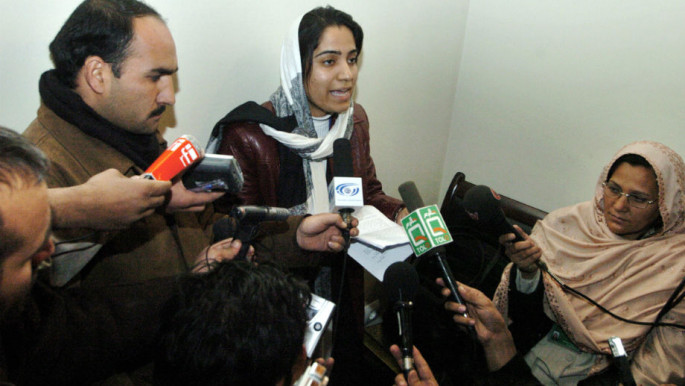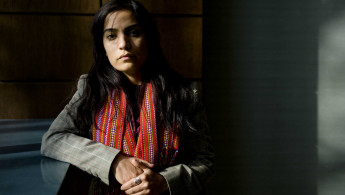Malalai Joya: One woman standing against warlords
"The resistance of the people is the real hope," says Malalai Joya, a fearless human rights activist and a former member of the Afghan parliament.
She was speaking in Rome about the threat faced by human rights defenders around the world. But she hardly spoke about her struggle, and more about that of all Afghans fighting discrimination and oppression.
"The European countries are deporting Afghans back," she says. "But many of them have only two ways in front of them: to became drug addicted, or to join the Islamic State group or Taliban who pay $600 per month for their fighters.
"Millions of Afghans are suffering from insecurity, corruption and unemployment. When they leave Afghanistan and they come to Western countries they face enormous risks, and finally, when they arrive, they have also to deal with discrimination. But I believe the US and NATO - including Italy - have a huge responsibility for the current economic situation of Afghanistan."
Joya, who shares a forename with Afghan national hero Malalai of Maiwand, is today as passionate and fearless as she was under the Taliban regime, when she used to run underground schools for girls.
She has become a global symbol of resistance against corruption and oppression, and an inspiration for women around the world. Today, she continues to be outspoken against what she calls "the warlord system", accusing western countries of betraying the values of democracy and human rights in Afghanistan.
 |
The only demand of the people is justice - Hekmatyar should at least apologise to the Afghan people |  |
"Somehow, things for activists like me have become even worse," she said. "Under the Taliban, we had only one enemy - now we have Taliban, warlords, Islamic State, occupation forces that keep dropping bombs, and the so-called technocrats, who have compromised in exchange for money and power."
Laura Cesaretti was in Rome, and spoke to Malalai Joya on behalf of The New Arab.
Laura Cesaretti: 'Malalai, in 2007 you publicly confronted the Afghan parliament, denouncing the warlords' system in Afghan politics. What has changed since then?'
Malalai Joya: "Unfortunately, the situation has become even more of a disaster. Still, our country is considered on the top of the list of drug producers, corruption, unhappy [citizens], misogynists and war-affected.
"The reason is because, after 9/11, US and NATO forces replaced the Taliban regime with fundamentalist warlords who had caused a civil war in 1992 to 1996. In Kabul alone, more than 65,000 innocent people were killed - 20-year-old mothers raped, as well as young girls. Many of the crimes they committed were not different from those committed later by the Taliban.
 |
| Joya was a member of the Afghan parliament until 2007, when she was dismissed for calling out the presence of warlords in the chamber [Getty] |
"The change was only physical, and their bloody hands were imposed on the Afghan people."
LC: 'A few days ago, Gulbuddin Hekmatyar, the notorious Afghan warlord, returned to Kabul after nearly two decades in exile. For many, it was a shock, but others welcomed it as an important step toward peace. What do you think?'
MJ: "The result of this so-called 'peace' will be more bloodshed and more human rights violations. We have experienced that already, 15 years ago, with the so-called 'peace of the warlords'. The only demand of the people is justice - Hekmatyar should at least apologise to the Afghan people.
"Instead, the first day he arrived in Kabul, he attacked the media - and we have freedom of media written into our constitution."
LC: 'How can Afghanistan put a difficult past behind it, and work towards a better future?'
MJ: "Since the Soviet invasion until now, war has been ongoing. People, especially the most uneducated, have lost everything. But we do have one thing: political consciousness. That is why my message around the world is always 'please, empower our people with education'.
"But the system is corrupt. It is true that some schools have been built, especially in the big cities, but it was just a justification for the occupation."
 |
What has happened? The small fish went to jail while sharks are still free |  |
LC: 'The NATO coalition said that women rights in Afghanistan were one of the most important achievements reached with the intervention. Do you agree with that?'
MJ: "This is propaganda of the US and NATO to the mainstream media. They were not the first to bring women's rights to Afghanistan. This is a lie. Even mainstream media in the 1960s used to report Afghanistan with women dressing more or less like western people. They were playing a role in the society.
"Only when these fundamentalist warlords came to power and these extremists who mix Islam with politics arrived, the situation of women became a disaster… The story of Farkhunda and how she was killed in daylight, just a few kilometres away from the palace offices is one example.
"What has happened? The small fish went to jail while sharks are still free. We are very far away from values such as peace and democracy - as long as fundamentalists remain in power, as long as the occupation will be in the country, it is will be still a prolonged struggle."
Malalai Joya was speaking to freelance journalist Laura Cesaretti on behalf of The New Arab. Follow Laura on Twitter: @laucesaretti



